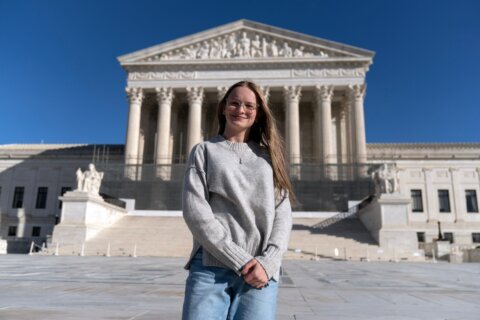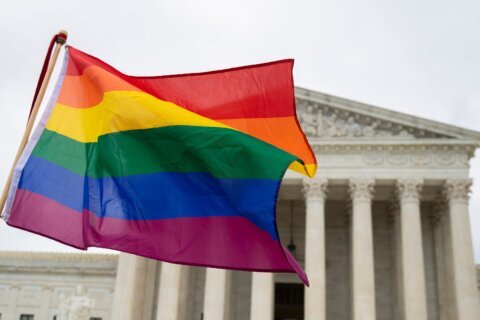Supreme Court Justice Ruth Bader Ginsburg discussed a myriad of issues including her famously equal marriage, the obstacles facing working women and the justices’ shared desire to protect the court on Tuesday in her first public remarks on politics since the end of the term.
The 86-year-old justice and accomplished former women’s rights lawyer spoke fondly of her late, beloved husband, Martin Ginsburg, when asked for her “secret” to their famously equal — and thus, at the time, unusual — marriage.
“It’s no secret,” she said with laugh, while speaking at an event hosted by the Georgetown University’s Law School’s Supreme Court Institute in Washington. She added that “it was luck that I met Marty at a time when the best degree that a girl could have was not her BA or her JD, it was her M-R-S.”
While the couple did not have explicit negotiations over housework and child raising, she said, each took on the brunt of the work when the other was pursuing a key goal, such as when Martin Ginsburg strove to become a partner at his law firm in five years.
“Then it switched when the women’s movement came alive at the end of the ’60s, and Marty realized that what I was doing was very important,” she said.
But the day-to-day experience of marriage seems to have helped her in her law career. Ginsburg recounted how on her wedding day, Marty’s mother took her aside and advised her that the key to a happy marriage was that “sometimes, it helps to be a little deaf.”
“It was excellent advice for the two law faculties on which I served, the DC circuit, and even today at the Supreme Court,” she quipped.
She said that in retrospect, “I certainly lucked out” in ultimately being blocked from getting a job at a big law firm due to sexism at the time. That roadblock pushed her to pursue teaching and gender equality work. She cited former Justice Sandra Day O’Connor’s story that if it hadn’t been for discrimination, they “would be today retired partners from some large law firm.”
“But because we didn’t have that route to travel, we had to find another way,” she added.
When asked about achieving gender parity in politics — in light of the one-third female court and historic number of women elected to Congress during the last midterms — Ginsburg acknowledged the advances as “impressive numbers,” but not enough.
Ginsburg said that while “almost all of those explicit barriers” facing women that she fought against in the 1970s are gone, “what remains is what’s often been called unconscious bias.”
She cited an example of conducting orchestra auditions behind a curtain to combat a sexist music critic.
“Sadly, we can’t duplicate the dropped curtain” in electoral politics, she said, later adding that “for women employed today outside the home, unconscious bias is there.”
She also reiterated her previous praise for fellow Justice Brett Kavanaugh regarding the historic first achieved by his all-female clerk staff.
“There is a very important first on the Supreme Court this term, and it’s thanks to our new justice, Justice Kavanaugh, whose entire staff is all women. All of his law clerks are women,” she said. “And with his four women as law clerks, it’s the first time in the history of the United States that there have been more women clerking at the court than men.”
Ginsburg also addressed whether the court should consider its place in the American political system, affirming that, “I think all of us do.”
“And no matter where we are on the political spectrum, the one thing that each of us feels deeply is we want to leave that institution in as good a shape as we found it,” she said. “We do not want to do anything to tarnish the court’s reputation.”






